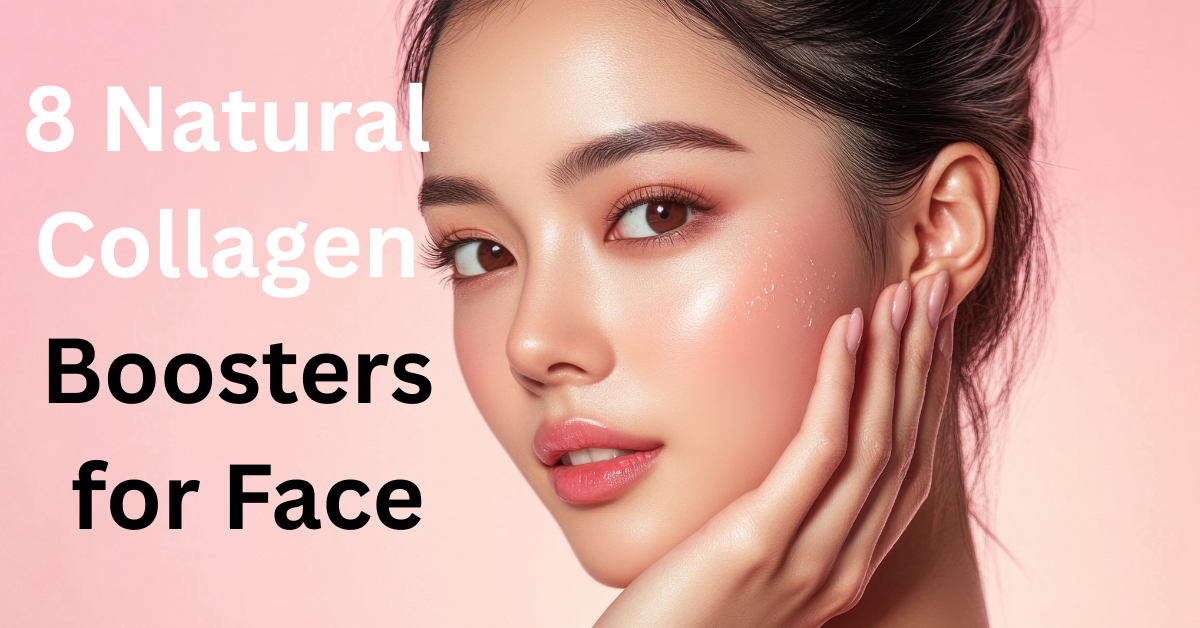Explore 8 natural collagen boosters for the face to achieve radiant, youthful skin by improving elasticity, hydration, and repair.
Collagen: Why is it important in anti-aging?
Collagen is a protein that our body produces naturally. Vitamin C plays a vital role in collagen production.
Collagen is found in skin, tendons, bones, and cartilage. It provides structural support to tissues and plays important roles, like
- tissue repair
- immune response
- cellular communication
cellular migration
Fibroblasts (cells of connective tissue) produce and maintain collagen. As people age, their collagen becomes fragmented, and fibroblast function and collagen production slow.
These changes, along with the loss of another key structural protein called elastin, lead to signs of aging such as sagging skin and wrinkles.
What are Collagen Boosters?
Collagen Boosters are foods, nutrients, or lifestyle factors that help the body in the production of collagen or protect existing collagen.
Types of collagen
- Nutritional collagen booster (from food)
- Supplements (hydrolyzed collagen peptides)
- Lifestyle collagen boosters
How does food boost Collagen?
Food boosts collagen indirectly by providing the raw material to your body, like nutrients, minerals, amino acids, and vitamins, through which the body produces and protects collagen.
8 natural collagen boosters for the face
- Bone broth
- Citrus fruit
- Berries
- Leafy greens
- Fish
- Nuts and seeds
- Tomatoes
- Eggs
Bone broth:
- Bone broth is a liquid made from boiling animal bones. It is high in protein and other nutrients.
- A direct source of collagen, gelatin, and amino acids.
- It improves skin firmness and smoothness.
Citrus fruit:
- Citrus fruit is rich in vitamin C.
- Vitamin C plays a vital role in collagen synthesis
- It brightens skin.
- Its antioxidant nature also helps skin as it fights against free radicals.
- Examples of citrus fruit like Oranges, lemons, and Amla.
Berries:
- Berries like Strawberries, Blueberries, and Blackberries.
- Again, Berries are packed with vitamin C and antioxidants.
- It helps the body to prevent collagen breakdown, and eventually it works as an anti-aging treatment.
Leafy greens:
- Leafy greens like spinach, fenugreek, and moringa are powerful collagen boosters.
- The nutrient profile of leafy greens includes vitamin A, vitamin C, magnesium, and iron, rich in antioxidants.
- The green pigment (chlorophyll) it contains may stimulate collagen production.
- Vitamin A helps in regular cell turnover.
- Minerals like magnesium and iron support tissue repair and oxygen delivery to skin cells.
Fish:
- Fish, especially fatty fish like salmon, sardines, and mackerel.
- Fish are a good source of omega-3 fatty acids, which help in maintaining the skin barrier by keeping it plump and hydrated.
- It may slow down collagen breakdown caused by sun exposure.
- Fish are high in protein, and we get key amino acids glycine and proline.
- The body uses these amino acids for the production of collagen.
- Vitamin D supports skin repair.
- The selenium content of fish helps in preventing collagen breakdown due to oxidative stress.
Nuts and Seeds:
- Nuts and seeds like cashew, almonds, pumpkin seeds, and sunflower seeds are rich in Zinc.
- Zinc is essential for collagen synthesis and tissue repair.
- High vitamin E in hazelnuts, almonds, and sunflower seeds protects against collagen damage due to UV rays.
- Chia seeds, walnuts, and flaxseeds are rich in omega-3 fatty acids.
- Amino acids like arginine and lysine aid in collagen structure formation.
- Copper is found in sesame seeds and cashews help in forming cross-links in collagen and elastin, making skin firm.
Tomatoes:
- Tomatoes contain lycopene.
- It protects skin from UV damage.
- Supports smooth and radiant skin.
Eggs:
- Eggs are rich in protein.
- Egg whites contain an amino acid named proline.
- Proline is a collagen-building amino acid.
- Biotin, another nutrient from eggs, also promotes healthy skin.

